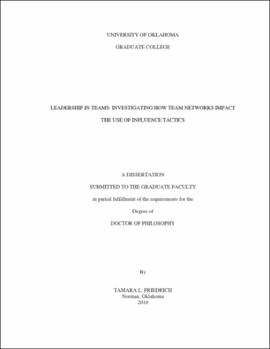| dc.description.abstract | Influence is at the core of the leadership process, and although significant research has been conducted evaluating the use and consequences of different influence tactics, it has rarely been studied in the context of the team's social system. Based on prior research on contextual and team leadership, and the new emergent body of social network research, it is proposed that the social context that a leader operates in can provide important opportunities and restrictions on their actions, and specifically their use of different influence strategies. Study participants were placed in hypothetical teams that varied in three social network characteristics - size, connectedness, and embeddedness of relationships. Additionally, participants were given both an organizational restructuring task and innovation task with task-focused and people-focused problems. Results indicate that Yukl and colleagues' (Yukl, Seifert, & Chavez, 2008) 11 proactive influence tactics were used differentially across different social network conditions and across the different task domains and problem orientations. Based on these findings it appears that leaders do make an assessment of their social network and glean information from it on resource costs, interpersonal costs, and logistical opportunities of using each influence tactic, and indicators about relevant team processes that would impact tactic selection. Additionally, differences in tactic use across task domains and problem types indicate that leaders considered the appropriateness of the influence tactic to the given problem. | |
